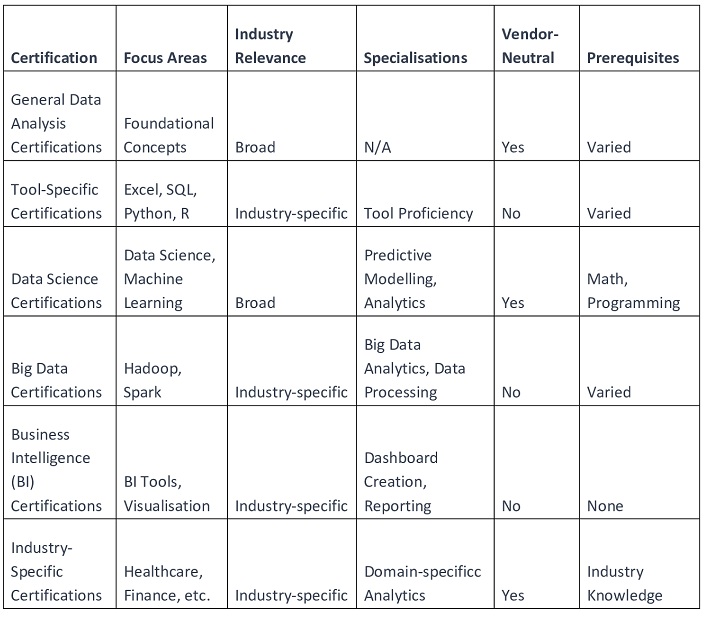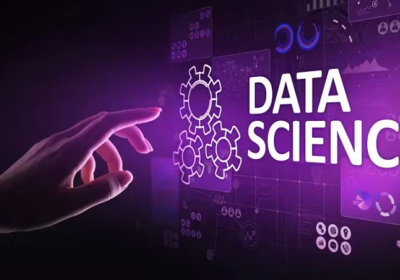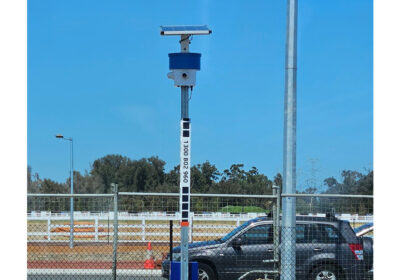
Data Analysis Certifications: Which Ones Matter?
In the rapidly growing landscape of data analysis, certifications stand as verifiable milestones, showcasing an individual’s proficiency and commitment to mastering the intricacies of this dynamic field. Complemented by a comprehensive Data Analytics Course, these certifications are a testament to one’s skill set, providing a recognised standard that resonates with employers and industry peers.
As the demand for data-driven decision-making intensifies, the significance of holding relevant certifications becomes increasingly pronounced. This article explores the realm of data analysis certifications, shedding light on the ones that hold substantial weight in the industry. Whether aiming for mastery in specific tools or seeking broader analytics expertise, these certifications offer a structured path for professionals to validate their capabilities and stay abreast of emerging trends, ensuring their relevance in the competitive data analytics landscape.
Types of Data Analysis Certifications
Various types of data analysis certifications cater to different aspects of the field, reflecting the diverse skill sets required in this dynamic domain. Here are some notable types:
- General Data Analysis Certifications: These certifications provide a foundational understanding of data analysis principles, statistical techniques, and data interpretation skills.
- Tool-Specific Certifications: Focused on individual tools such as Excel, SQL, Python, and R or specialised platforms like Tableau and Power BI, these certifications validate proficiency in using specific tools for practical data analysis and visualisation.
- Data Science Certifications: Covering a comprehensive range of topics, including statistical analysis, machine learning, and predictive modelling, data science certifications are designed for professionals seeking expertise in advanced analytics and decision support.
- Big Data Certifications: This certification is for professionals dealing with large-scale datasets. These certifications often involve technologies like Hadoop and Spark, validating skills in managing and analysing big data.
- Business Intelligence (BI) Certifications: Focusing on BI tools, reporting, and data visualisation, these certifications are essential for professionals transforming raw data into actionable insights for business decision-making.
- Industry-Specific Certifications: This certification is for healthcare, finance, or marketing professionals. These certifications emphasise domain-specific data analysis skills relevant to the industry.
- Certified Analytics Professional (CAP): Recognising broad analytics competency, CAP is vendor-neutral and applicable across various industries, emphasising a holistic understanding of analytics principles.
- Cloud-Based Data Analysis Certifications: These certifications validate proficiency in utilising cloud platforms such as AWS, Azure, or Google Cloud for data analysis, and they are crucial in today’s era of cloud computing.
- Machine Learning Certifications: These focus on applying machine learning algorithms, model deployment, and advanced analytics; these certifications are for professionals seeking expertise in the rapidly evolving field of machine learning.
- Certifications from Tech Giants: Offered by major companies like Microsoft, IBM, Google, and SAS, these certifications validate skills in specific tools and technologies developed by these companies, enhancing credibility in their ecosystems.
- Specialised Analytics Certifications: These cover niche areas such as web analytics, social media analytics, or fraud analytics; these certifications cater to professionals specialising in specific analytical domains.
Selecting the right mix of certifications depends on individual career aspirations, the specific tools and methodologies used in the industry, and the desired level of specialisation. A combination of general and specialised certifications ensures a well-rounded skill set, positioning professionals as adept analysts in today’s diverse and dynamic data landscape.
Which Data Certifications Matters?
The significance of data certifications lies in their ability to validate and showcase a professional’s expertise in various aspects of data analysis. Certifications that matter most align with an individual’s career objectives and industry demands. General data analysis certifications provide a foundational understanding, while specialised certifications in machine learning, big data, or business intelligence cater to specific skill sets.
Vendor-neutral certifications like the Certified Analytics Professional (CAP) are for their applicability across industries. A comprehensive Data Analytics Course in Hyderabad further enhances skills to complement these certifications. It ensures practical knowledge, offering a tangible demonstration of sought-after competencies in the dynamic data analytics landscape.
Tips to Choose the Right Data Analysis Certification:
- Define Your Goals: Clarify your career objectives and areas of interest within data analysis. Determine whether you aim for a general understanding or specialisation in specific tools, techniques, or industries.
- Research Industry Relevance: Investigate the certifications most valued in your target industry. Some certifications may be more relevant in finance, while others are highly esteemed in healthcare or technology.
- Consider Specialisations: Assess your interest in specialised domains like machine learning, big data, or business intelligence. Choose certifications that align with your desired skill set and career trajectory.
- Vendor-Neutral vs. Tool-Specific: Based on your intended use, decide whether you prefer vendor-neutral certifications applicable across various technologies or certifications specific to particular tools like SQL, Python, or Tableau.
- Check Prerequisites and Difficulty: Review the prerequisites and difficulty levels of certifications. Ensure they match your skill level and align with the time and effort you wish to invest in the certification process.
- Explore Course Content: Delve into the course content and curriculum of potential certifications. Look for programs that cover relevant topics and offer practical applications, ensuring a comprehensive understanding of data analysis concepts.

Conclusion:
Selecting the correct data analysis certification is a strategic decision hinging on individual aspirations and industry demands. Whether pursuing general proficiency or specialising in tools and domains, a well-chosen certification enhances credibility. The evolving landscape of data analytics emphasises the importance of staying informed and aligning certifications with personal career goals for a lasting impact in this dynamic field.
ExcelR – Data Science, Data Analytics and Business Analyst Course Training in Hyderabad
Address: Cyber Towers, PHASE-2, 5th Floor, Quadrant-2, HITEC City, Hyderabad, Telangana 500081
Phone: 096321 56744

















